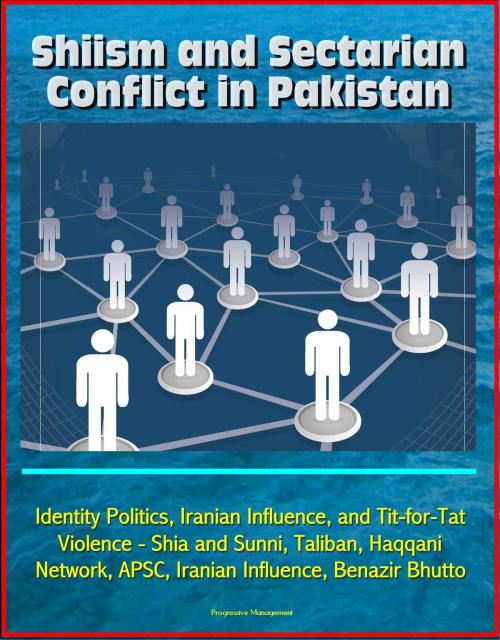Shiism and Sectarian Conflict in Pakistan: Identity Politics, Iranian Influence, and Tit-for-Tat Violence - Shia and Sunni, Taliban, Haqqani Network, APSC, Iranian Influence, Benazir Bhutto
Nonfiction, Social & Cultural Studies, Political Science| Author: | Progressive Management | ISBN: | 9781301892792 |
| Publisher: | Progressive Management | Publication: | February 5, 2013 |
| Imprint: | Smashwords Edition | Language: | English |
| Author: | Progressive Management |
| ISBN: | 9781301892792 |
| Publisher: | Progressive Management |
| Publication: | February 5, 2013 |
| Imprint: | Smashwords Edition |
| Language: | English |
Issues surrounding militancy among the Shi'a community in the Shi'a heartland and beyond continue to occupy scholars and policymakers. During the past year, Iran has continued its efforts to extend its influence abroad by strengthening strategic ties with key players in international affairs, including Brazil and Turkey. Iran also continues to defy the international community through its tenacious pursuit of a nuclear program. The Lebanese Shi'a militant group Hizballah, meanwhile, persists in its efforts to expand its regional role while stockpiling ever more advanced weapons. Sectarian violence between Sunnis and Shi'a has escalated in places like Saudi Arabia, Yemen, Bahrain, and not least, Pakistan. Some of the subjects covered include Shia, Sunni, Taliban, Haqqani Network, General Mohammad Ayubkhan, General Muhammed Zia-Ul-Haq, General Pervez Musharaff, Prime Minister Alikhan, All Parties Shia Conference (APSC), Iranian Influence, Benazir Bhutto.
As a hotbed of violent extremism, Pakistan, along with its Afghan neighbor, has lately received unprecedented amounts of attention among academics and policymakers alike. While the vast majority of contemporary analysis on Pakistan focuses on Sunni extremist groups such as the Pakistani Taliban or the Haqqani Network —arguably the main threat to domestic and regional security emanating from within Pakistan's border —sectarian tensions in this country have attracted relatively little scholarship to date. Mindful that activities involving Shi'i state and non-state actors have the potential to affect U.S. national security interests, the Combating Terrorism Center is therefore proud to release this latest installment of its Occasional Paper Series, Shiism and Sectarian Conflict in Pakistan: Identity Politics, Iranian Influence, and Tit-for-Tat Violence.
This monograph is published as part of the CTC's Shi'a Militancy Program, established in 2008, which dedicates efforts toward investigating the real or potential emergence of Shi'a militancy, as well as its causes, nature, and potential implications for U.S. national security. Shiism and Sectarian Conflict in Pakistan is the fourth monograph published under the framework of the CTC's Shi'a Militancy Program.
Since its founding in 1947, Pakistan has been accustomed to conflict, but in recent years the regime in Islamabad had to contend with new waves of militancy, including violence that directly challenges the country's leadership from within. Among groups involved in internal conflicts in Pakistan, Shia militant groups have received relatively scant attention, even though sectarian violence can have direct ramifications on the security of the country, and South Asia at large. This Occasional Paper examines the sectarian landscape in Pakistan, the growing potential for Shia-Sunni violence, and the implications of simmering sectarian tension for domestic Pakistani and regional security.
Issues surrounding militancy among the Shi'a community in the Shi'a heartland and beyond continue to occupy scholars and policymakers. During the past year, Iran has continued its efforts to extend its influence abroad by strengthening strategic ties with key players in international affairs, including Brazil and Turkey. Iran also continues to defy the international community through its tenacious pursuit of a nuclear program. The Lebanese Shi'a militant group Hizballah, meanwhile, persists in its efforts to expand its regional role while stockpiling ever more advanced weapons. Sectarian violence between Sunnis and Shi'a has escalated in places like Saudi Arabia, Yemen, Bahrain, and not least, Pakistan. Some of the subjects covered include Shia, Sunni, Taliban, Haqqani Network, General Mohammad Ayubkhan, General Muhammed Zia-Ul-Haq, General Pervez Musharaff, Prime Minister Alikhan, All Parties Shia Conference (APSC), Iranian Influence, Benazir Bhutto.
As a hotbed of violent extremism, Pakistan, along with its Afghan neighbor, has lately received unprecedented amounts of attention among academics and policymakers alike. While the vast majority of contemporary analysis on Pakistan focuses on Sunni extremist groups such as the Pakistani Taliban or the Haqqani Network —arguably the main threat to domestic and regional security emanating from within Pakistan's border —sectarian tensions in this country have attracted relatively little scholarship to date. Mindful that activities involving Shi'i state and non-state actors have the potential to affect U.S. national security interests, the Combating Terrorism Center is therefore proud to release this latest installment of its Occasional Paper Series, Shiism and Sectarian Conflict in Pakistan: Identity Politics, Iranian Influence, and Tit-for-Tat Violence.
This monograph is published as part of the CTC's Shi'a Militancy Program, established in 2008, which dedicates efforts toward investigating the real or potential emergence of Shi'a militancy, as well as its causes, nature, and potential implications for U.S. national security. Shiism and Sectarian Conflict in Pakistan is the fourth monograph published under the framework of the CTC's Shi'a Militancy Program.
Since its founding in 1947, Pakistan has been accustomed to conflict, but in recent years the regime in Islamabad had to contend with new waves of militancy, including violence that directly challenges the country's leadership from within. Among groups involved in internal conflicts in Pakistan, Shia militant groups have received relatively scant attention, even though sectarian violence can have direct ramifications on the security of the country, and South Asia at large. This Occasional Paper examines the sectarian landscape in Pakistan, the growing potential for Shia-Sunni violence, and the implications of simmering sectarian tension for domestic Pakistani and regional security.















